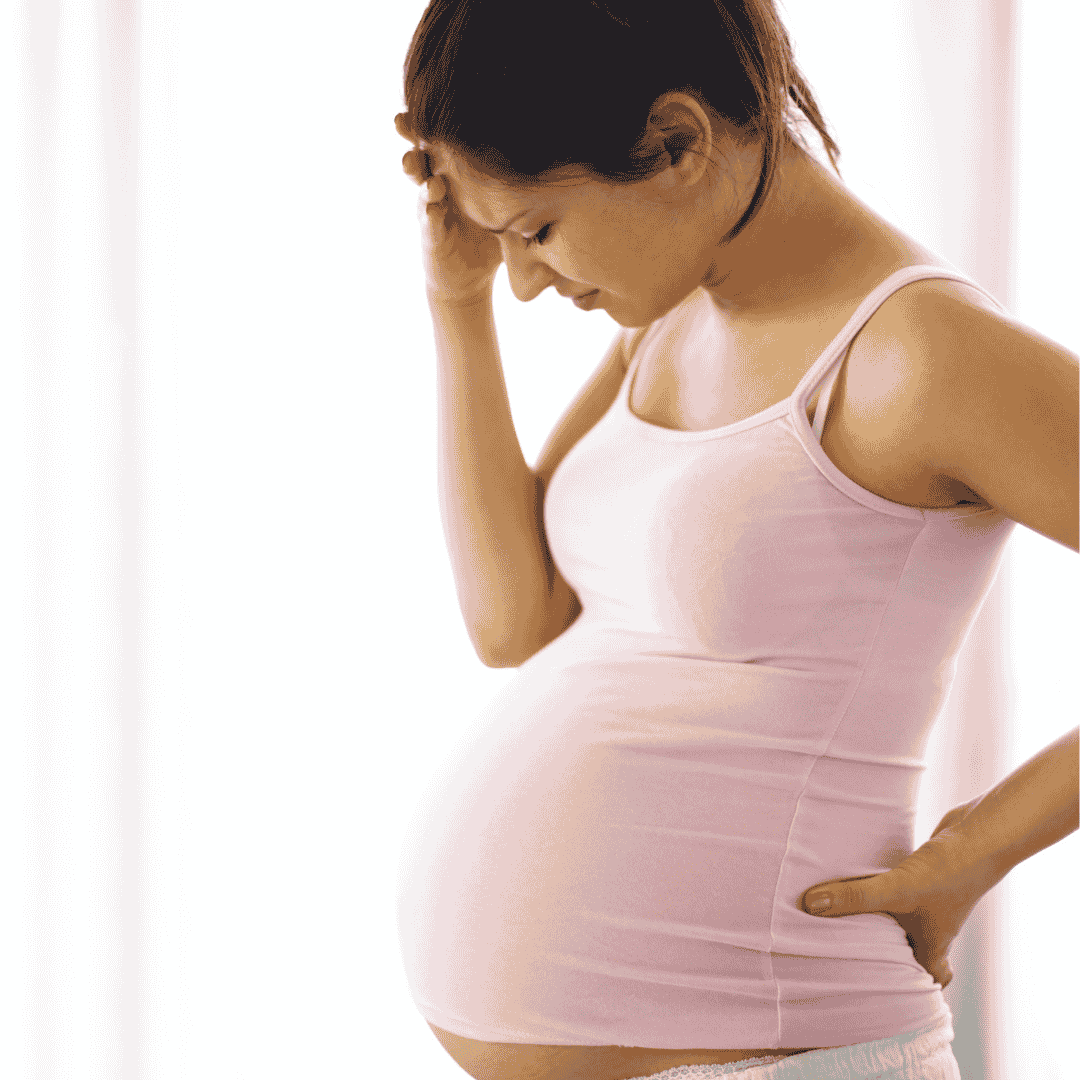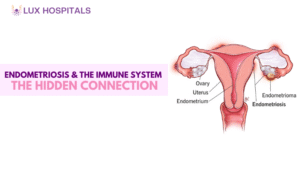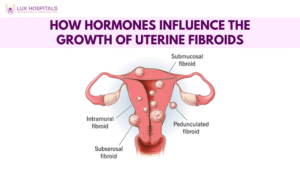4 Severe Endometriosis Complications in Pregnancy

Introduction
Endometriosis complications in pregnancy are often a silent battle, affecting millions of women worldwide, many of whom may not even realize the impact it has on their fertility and pregnancy journey. For those who dream of becoming mothers, the road can be filled with uncertainty and challenges. But with knowledge and proper care, women with endometriosis can navigate these complications in pregnancy with confidence.
Endometriosis is a chronic condition where tissue similar to the lining of the uterus, known as the endometrium, grows outside the uterus, causing pain, inflammation, and in some cases, fertility issues. Affecting approximately 10% of women of reproductive age, endometriosis is a common yet often misunderstood condition. Its impact extends beyond physical symptoms, as endometriosis complications in pregnancy can also take an emotional toll, especially when it comes to planning a family.

The condition can complicate conception, and, for those who do become pregnant, it may introduce additional risks during pregnancy. Understanding how endometriosis can influence this significant life event is crucial for ensuring the best possible outcomes.
This blog aims to shed light on endometriosis complications in pregnancy and how they can affect the journey to motherhood. By understanding these potential complications and learning about effective management strategies, women with endometriosis can better prepare for a healthy pregnancy. We will explore the risks, symptoms, and care options available, empowering women with the knowledge they need to face this journey with resilience and hope.
Pregnancy with Endometriosis
One of the most common concerns for women with endometriosis is whether they can conceive. The good news is that despite the potential endometriosis complications in pregnancy, many women with this condition can achieve pregnancy, though it may require more time, patience, and sometimes medical intervention. Endometriosis can impact fertility, primarily by causing scar tissue and inflammation that may affect the ovaries, fallopian tubes, and surrounding reproductive organs. However, with proper treatment and support, many women successfully conceive and carry a pregnancy to term.
How Pregnancy Affects Endometriosis
Pregnancy induces significant hormonal changes, which can temporarily affect the symptoms of endometriosis. During pregnancy, the body produces higher levels of progesterone, a hormone that can suppress the growth of endometrial tissue. As a result, some women may experience a reduction in endometriosis-related pain and discomfort during pregnancy.
Temporary Relief During Pregnancy
For many women, pregnancy brings a welcomed period of relief from the often debilitating symptoms of endometriosis. The hormonal environment of pregnancy, particularly the increased levels of progesterone, can halt the progression of the disease, leading to a temporary remission of symptoms. However, this relief is usually temporary, with endometriosis complications in pregnancy potentially returning after childbirth, especially if breastfeeding is not prolonged or if hormonal treatments are not continued.
While pregnancy can provide some respite, it is not a cure for endometriosis. Understanding the potential impact of pregnancy on endometriosis symptoms can help women prepare for the changes they may experience and plan their care accordingly.
Complications During Pregnancy
Potential Risks and Complications
While many women with endometriosis can have healthy pregnancies, endometriosis complications in pregnancy do come with certain risks that should be closely monitored. Understanding these potential complications is crucial for ensuring both maternal and fetal health throughout the pregnancy.
- Increased Risk of Miscarriage:
Women with endometriosis may face a slightly higher risk of miscarriage, particularly in the first trimester. The exact reasons are not entirely understood, but it’s believed that the inflammatory environment caused by endometriosis might affect early pregnancy stability. - Preterm Birth Risks:
Another significant concern is the increased risk of preterm birth. Endometriosis can contribute to conditions that trigger early labor, such as inflammation or uterine abnormalities. Babies born preterm may face additional health challenges, making early detection and management essential. - Placenta Complications (Placenta Previa, Placental Abruption):
Placental complications, such as placenta previa (where the placenta covers the cervix) or placental abruption (where the placenta detaches from the uterus prematurely), are more common in pregnancies affected by endometriosis. These conditions can lead to severe bleeding and other complications, requiring careful monitoring and sometimes early delivery. - Risks of Cesarean Delivery:
Women with endometriosis may have a higher likelihood of requiring a cesarean delivery (C-section). This could be due to complications like abnormal placental attachment or scarring from previous surgeries related to endometriosis. A C-section might be planned in advance if these risks are identified early.
Symptoms to Watch Out For
During pregnancy, it’s important for women with endometriosis to be vigilant about certain symptoms that could indicate complications:
- Pain During Pregnancy:
While some women may experience relief from endometriosis pain during pregnancy, others might still encounter discomfort, particularly in the later stages. Any new or worsening pain should be promptly discussed with a healthcare provider, as it could signal a complication. - Unusual Bleeding or Spotting:
Bleeding or spotting during pregnancy is always a concern, but it can be particularly worrisome for women with endometriosis. This could indicate an issue with the placenta or other complications. Immediate medical attention is necessary if bleeding occurs. - Signs of Miscarriage or Preterm Labor:
Symptoms such as severe abdominal pain, cramping, back pain, or regular contractions before 37 weeks could be signs of preterm labor or miscarriage. Early recognition and intervention are key to managing these risks and protecting the health of both mother and baby.
By understanding these risks and symptoms, women with endometriosis can take proactive steps in collaboration with their healthcare providers to manage their pregnancy effectively, ensuring the best possible outcomes.
Managing Endometriosis During Pregnancy
Regular Monitoring and Care
For women with endometriosis, maintaining regular monitoring and care throughout pregnancy is crucial to ensure both maternal and fetal well-being.
- Importance of Regular Check-Ups:
Frequent prenatal visits allow healthcare providers to closely monitor the pregnancy and promptly address any potential complications. Regular ultrasounds, blood tests, and physical exams help track the baby’s development and the mother’s health. These check-ups are particularly important for identifying issues like placental complications, preterm labor risks, or any resurgence of endometriosis complications in pregnancy. - Working with a Specialized Healthcare Team:
Given the complexities of endometriosis and its potential impact on pregnancy, it’s beneficial to work with a healthcare team that includes specialists, such as a high-risk obstetrician (maternal-fetal medicine specialist), an endometriosis specialist, and possibly a pain management expert. This multidisciplinary approach ensures that all aspects of endometriosis complications in pregnancy are carefully managed, from pain control to planning the delivery.
Pain Management Strategies
Managing pain during pregnancy, especially for women with endometriosis, requires a cautious approach to ensure the safety of both mother and baby.
- Safe Pain Relief Options During Pregnancy:
While some pain medications are not recommended during pregnancy, there are several safe options that can help manage discomfort. Acetaminophen (paracetamol) is often considered a safer choice for mild pain relief. Non-pharmacological methods such as warm baths, prenatal massages, and acupuncture can also provide relief. It’s important to consult with a healthcare provider before taking any medication or starting new treatments.
Lifestyle Adjustments
In addition to medical care, certain lifestyle adjustments can significantly contribute to managing endometriosis symptoms during pregnancy and promoting overall well-being.
- Diet and Exercise Tips:
Maintaining a healthy, balanced diet can help manage weight gain and reduce inflammation, which may alleviate some endometriosis symptoms. Including anti-inflammatory foods, such as fruits, vegetables, and omega-3-rich fish, can be beneficial. Regular, low-impact exercise, like walking or prenatal yoga, helps improve circulation, reduce stress, and maintain flexibility, all of which can ease discomfort during pregnancy. - Stress Management Techniques:
Pregnancy, especially with a condition like endometriosis, can be stressful. Chronic stress may exacerbate endometriosis symptoms, so incorporating stress management techniques is vital. Practices such as mindfulness meditation, deep breathing exercises, and prenatal yoga can help reduce anxiety and promote relaxation. Finding support through counseling or joining a support group for women with endometriosis can also provide emotional relief and a sense of community.
By focusing on regular monitoring, effective pain management, and healthy lifestyle adjustments, women with endometriosis can better navigate the challenges of pregnancy, ensuring a safer and more comfortable experience.
Post-Pregnancy Considerations
Postpartum Recovery with Endometriosis
The postpartum period is a time of significant physical and emotional change, especially for women with endometriosis. Understanding how childbirth might impact endometriosis symptoms is essential for planning recovery.
- How Childbirth Might Affect Endometriosis Symptoms:
After childbirth, hormonal levels, particularly estrogen and progesterone, will gradually return to pre-pregnancy states, which may influence the activity of endometriosis. Some women may experience a temporary improvement in symptoms due to the lingering effects of pregnancy hormones. However, for others, endometriosis complications in pregnancy can lead to a return of symptoms, sometimes even more intensely, as the hormonal balance shifts. The postpartum period may also bring new challenges, such as increased pelvic pain or menstrual irregularities, which should be monitored and managed with the help of a healthcare provider.
Breastfeeding and Endometriosis
Breastfeeding can offer additional benefits for women with endometriosis, potentially impacting the condition’s progression.
- Potential Benefits of Breastfeeding on Endometriosis:
Breastfeeding naturally delays the return of menstruation through a process known as lactational amenorrhea. This period of reduced estrogen levels can slow the growth of endometrial tissue, providing a temporary respite from endometriosis symptoms. The longer a woman breastfeeds, the longer she might experience these benefits. However, once breastfeeding is reduced or stopped, and menstruation resumes, endometriosis complications in pregnancy may reappear. It’s important to discuss breastfeeding plans with a healthcare provider, as this decision can influence the management of endometriosis in the postpartum period.
Long-Term Management
Endometriosis is a chronic condition, and long-term management is crucial for maintaining quality of life and planning for future pregnancies.
- Planning for Future Pregnancies:
If a woman with endometriosis is considering more children, it’s essential to discuss future pregnancy plans with a healthcare provider early on. Endometriosis can progress over time, potentially affecting fertility and increasing the likelihood of endometriosis complications in pregnancy. Early and proactive management, including fertility treatments if necessary, can improve the chances of a successful pregnancy. For some women, pregnancy itself can have a temporary suppressive effect on endometriosis, but this is not a permanent solution. - Ongoing Treatment Options:
After pregnancy, treatment options for endometriosis may need to be revisited. These can include hormonal therapies, such as birth control pills, GnRH agonists, or progestin-based therapies, to manage symptoms and prevent the progression of the disease. In some cases, surgical intervention may be necessary to remove endometrial tissue or address complications like ovarian cysts. A comprehensive, individualized treatment plan developed in consultation with a healthcare provider will be key to managing endometriosis in the long term.
By understanding the potential impact of childbirth and breastfeeding on endometriosis, and by planning for long-term management, women can better navigate the postpartum period and make informed decisions about their health and future pregnancies.
Conclusion
In conclusion, while endometriosis complications in pregnancy can present challenges, understanding the potential risks and actively managing the condition can lead to positive outcomes for both mother and baby. With the right care and support, many women with endometriosis can experience healthy pregnancies and effective postpartum recovery.
If you are in Hyderabad and need specialized care for managing endometriosis during pregnancy, Lux Hospitals offers expert services tailored to your needs. Their experienced team is dedicated to providing comprehensive care for women with endometriosis, helping you navigate every step of your pregnancy journey with confidence.
If you’re facing pregnancy with endometriosis, don’t hesitate to seek the support you need. Contact Lux Hospitals in Hyderabad today to schedule a consultation and take the first step towards a healthier pregnancy.
Frequently Asked Questions
The most common complications include an increased risk of miscarriage, preterm birth, placental complications like placenta previa, and a higher likelihood of requiring a cesarean delivery.
Yes, complications such as preterm birth and placental issues can affect the baby’s health, potentially leading to low birth weight or other developmental concerns.
Management includes regular prenatal care, working with a specialized healthcare team, safe pain relief options, and making lifestyle adjustments such as a balanced diet and stress management techniques.
Warning signs include severe abdominal pain, unusual bleeding or spotting, and signs of preterm labor, such as regular contractions before 37 weeks.
No, not every woman with endometriosis will experience complications. While the risk is higher, many women with endometriosis have healthy pregnancies without significant issues.
Discuss your specific risks, the best management strategies, potential signs of complications, and your delivery plan, including the possibility of a cesarean section if necessary.




















